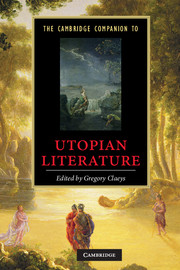Book contents
- Frontmatter
- Part I History
- 1 The concept of utopia
- 2 Thomas More’s Utopia: sources, legacy, and interpretation
- 3 Utopianism after More: the Renaissance and Enlightenment
- 4 Paradise transformed: varieties of nineteenth-century utopias
- 5 The origins of dystopia: Wells, Huxley and Orwell
- Part II Literature
- Further reading
- Index
1 - The concept of utopia
from Part I - History
Published online by Cambridge University Press: 28 September 2010
- Frontmatter
- Part I History
- 1 The concept of utopia
- 2 Thomas More’s Utopia: sources, legacy, and interpretation
- 3 Utopianism after More: the Renaissance and Enlightenment
- 4 Paradise transformed: varieties of nineteenth-century utopias
- 5 The origins of dystopia: Wells, Huxley and Orwell
- Part II Literature
- Further reading
- Index
Summary
The study of the concept of utopia can certainly not be reduced to the history of the word coined by Thomas More in 1516 to baptize the island described in his book. However, a careful consideration of the circumstances in which the word was generated can lead us to a better understanding of what More meant by the word as well as of the new meanings it has acquired since then. It must be remembered that in 1516 the word utopia was a neologism. Neologisms correspond to the need to name what is new. By revealing the changes that the shared values of a given group undergo, the study of neologisms provides us not only with a dynamic portrait of a particular society over the ages but also with a representation of that society in a given period. There are basically three kinds of neologisms: they may be new words created to name new concepts or to synthesize pre-existing ones (lexical neologisms); they may be pre-existing words used in a new cultural context (semantic neologisms); or they may be variations of other words (derivation neologisms). Utopia, as a neologism, is an interesting case: it began its life as a lexical neologism, but over the centuries, after the process of deneologization, its meaning changed many times, and it has been adopted by authors and researchers from different fields of study, with divergent interests and conflicting aims. Its history can be seen as a collection of moments when a clear semantic renewal of the word occurred.
- Type
- Chapter
- Information
- The Cambridge Companion to Utopian Literature , pp. 3 - 27Publisher: Cambridge University PressPrint publication year: 2010
- 72
- Cited by



